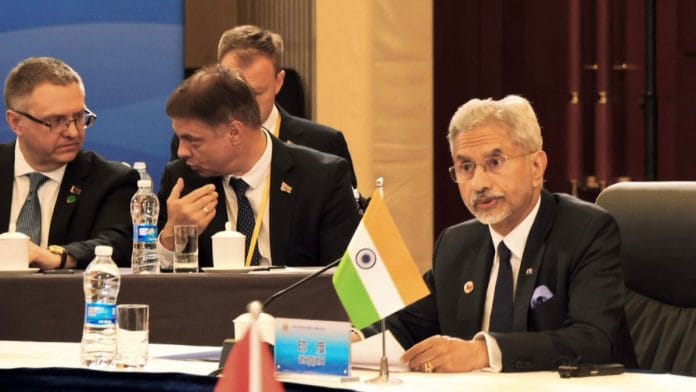New Delhi: The Shanghai Cooperation Organisation (SCO) must be “uncompromising” in its fight against “terrorism, separatism and extremism”. That was External Affairs Minister S. Jaishankar’s message at the foreign ministers’ conference in Tianjin Tuesday, delivered in the presence of Pakistan’s Foreign Minister Ishaq Dar.
“The three evils that SCO was founded to combat were terrorism, separatism and extremism. Not surprisingly, they often occur together. Recently, we in India witnessed a graphic example in the terrorist attack in Pahalgam on 22 April 2025. It was deliberately conducted to undermine the tourism economy of Jammu and Kashmir, while sowing a religious divide,” Jaishankar said in his remarks during the meeting.
The Indian External Affairs Minister added: “The UN Security Council, of which some of us are currently members, issued a statement that condemned it in the strongest terms and underlined the need to hold perpetrators, organisers, financiers and sponsors of this reprehensible act of terrorism accountable and bring them to justice. We have since done exactly that and will continue doing so.”
Jaishankar is on a two-day visit to China from 14 July till 15 July. He held a number of bilateral meetings with Chinese leaders Monday during his visit to Beijing. He also called on Chinese President Xi Jinping. Tuesday was the meeting of the foreign ministers in Tianjin, which is set to host the Heads of State summit later this year.
This is the first visit by the Indian External Affairs Minister to China since the clashes in Galwan in the summer of 2020. Ties between India and China cratered following the clashes. The political thaw in ties was initiated following the announcement of an agreement to disengage at the friction points along the Line of Actual Control (LAC) last October.
“We will continue to positively approach new ideas and proposals that are genuinely for our collective good. It is essential that such cooperation is based on mutual respect, sovereign equality and in accordance with territorial integrity and sovereignty of member states,” said Jaishankar in his message to the organisation.
He is the third Indian leader to visit China in the last month as a part of the different meetings under the SCO umbrella, before the leaders summit later this year. It is one of the few forums where both India and Pakistan interact.
Jaishankar’s message on terrorism and territorial integrity came a couple of months after the 87-hour conflict between India and Pakistan in May 2025. On 22 April, terrorists in Jammu and Kashmir’s Pahalgam killed 26 people.
India launched Operation Sindoor in retaliation, targeting terrorist infrastructure in Pakistan. Islamabad further escalated the situation hitting Indian military infrastructure, which led to the short conflict between the two neighbours.
Last month, the defence ministers’ meeting of the SCO was unable to reach a consensus for a joint statement because they couldn’t agree on the language on terrorism. Pakistan had objected to references regarding the Pahalgam terrorist attack, which led to no joint statement being issued.
Afghanistan & economic engagement
Jaishankar called on the members of the SCO to “step up” development assistance to Afghanistan, promising that India will do so as well. The Taliban regime has been in control of Afghanistan since 2021. Russia, also a member of the SCO, recently moved to recognise the Taliban-led government in Kabul.
“Afghanistan has been long on the SCO agenda. The compulsions of regional stability are buttressed by our longstanding concern for the well-being of the Afghan people. The international community, particularly SCO members, must therefore step up with development assistance. India, for its part, will certainly do so,” Jaishankar said.
With regards to deepening economic collaboration between members of the SCO, Jaishankar pushed for the promotion of the International North South Transport Corridor (INSTC), a transport corridor that links Russia to India via Central Asia.
The INSTC is different from China’s own Belt and Road Initiative (BRI), which is President Xi’s landmark infrastructure initiative. Jaishankar’s promotion of the INSTC, which was envisioned in 2000, marks New Delhi’s attempt to suggest an alternative to the BRI.
(Edited by Viny Mishra)
Also read: Why do we pretend SCO still works? China runs it, shields Pakistan, sidelines India






